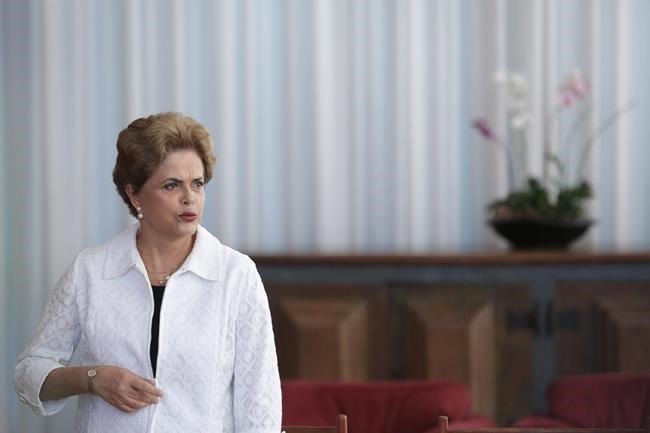
FILE - In this Friday, May 13, 2016 file photo, suspended Brazilian President Dilma Rousseff stands inside the presidential residence Alvorada Palace, in Brasilia, Brazil. While acting President Michel Temer gets comfortable in Rousseff’s former office, introducing new Cabinet members and announcing rapid-fire changes to the region’s most powerful economy, Rousseff has been holed up in the sprawling presidential palace, where she’s permitted to stay through a Senate trial in the coming months that will seal her fate. (AP Photo/Eraldo Peres, File)
May 19, 2016 - 11:03 AM
RIO DE JANEIRO - Hours after lawmakers voted to impeach Dilma Rousseff last week, Brazil's first female president blasted her enemies for making her "the victim of a great injustice" and promised a bruising fight to hold onto her mandate.
"I fought my whole life and I'm going to keep fighting," said Rousseff, a former Marxist guerrilla, looking both exhausted and haggard during her last press conference.
Since then Rousseff has all but disappeared, the latest surprise in one of the most bizarre and divisive political dramas to grip Latin America's largest nation in years.
While the acting president gets comfortable in Rousseff's former office, introducing new Cabinet members and announcing rapid-fire changes to the region's biggest economy, Rousseff has been holed up in the sprawling Alvorada presidential palace where she's permitted to stay even as she's suspended and awaiting a Senate trial that will determine her fate in the coming months.
She has not made any public appearances or held any events to rally supporters. She's even cut back on the morning bike rides that had become a daily ritual, and her once-robust Twitter feed has slowed to a trickle, repeating the same arguments against impeachment that she's been making for months.
Analysts say that even if she is deeply committed to fighting a process that she has long called a "coup" cooked up by power-hungry foes, she has few options. Rousseff and her left-leaning Workers' Party tried to combat impeachment at every implacable step and were repeatedly routed.
"There is not much she can do," said Ivar Hartmann, a law professor at the Getulio Vargas Foundation, a Rio de Janeiro research institute. "The only thing that could save her depends not on anything she could do or the Workers' Party could do, but (rather on) a poor performance by acting President Michel Temer."
So far, Rousseff appears to be taking a wait-and-see approach.
On Tuesday she met with senators who voted against her impeachment and was said to appear relaxed and confident that she could win back support of those who voted for impeachment.
"The interim government is making error after error, and the population doesn't feel represented by their proposals," Sen. Humberto Costa told the Folha de Sao Paulo newspaper.
When impeachment proceedings began about a year ago, Rousseff's ouster seemed like a distant unlikelihood. But the process cleared hurdle after hurdle, picking up momentum that repeatedly flattened Workers' Party efforts to block it.
Rousseff's congressional allies failed to secure the support needed to kill the measure in either chamber. On May 12, the impeachment camp garnered well over the simple majority needed to suspend Rousseff, and one vote more than the 54 that would be required to oust her permanently in the Senate trial.
Temer, her two-time running-mate turned nemesis, immediately assumed power and will remain while a trial takes place within the next six months.
The formal charge against Rousseff is that she used illegal budget tricks to hide deficits and bolster her struggling administration. She argues that previous presidents used similar measures and says the real motive for impeachment is a bid by the country's traditional ruling elite to retake power.
Her legal team has made several appeals to the Supreme Federal Tribunal, the country's highest court. All have failed.
Rousseff has tried to win over public opinion, framing the fight as one of angry elites trying to crush an administration focused on improving the lot of the poor. That too has largely flailed, with polls showing a majority of Brazilians support her ouster.
"My suspension is not only a legal matter but also a political one," Rousseff said last Friday in her most recent public comments. "Therefore we will have to defend ourselves politically and legally."
Still, it's hard to imagine that anything she may do could help fend off dismissal in the months ahead. And so far, Brazilians appear to be taking both Rousseff's suspension and Temer's ascension in stride.
Temer has been roundly criticized for picking an all-white, all-male Cabinet. He has come under fire for several policy proposals such as raising taxes and reforming the pension system. When he gave an interview Sunday night to the Globo news channel, residents of several cities protested by banging pots to try to drown out the broadcast.
Paulo Fassoni Arruda, a political science professor at the PUC Pontifical Catholic University in Sao Paulo, predicted a difficult road ahead for Temer.
"He has much more support in the Congress than in society at large," Arruda said, adding that Temer's choices over the past week have already alienated some social movements, artists and intellectuals.
None of that, however, has yet translated into a large outpouring of support for Rousseff, whose approval ratings hovered around 10 per cent in the months before she was impeached.
It's also unclear whether the Workers' Party or the unions connected to it will be able to mobilize major protests or strikes that could change the equation.
The party, which governed South America's largest nation for 13 years, has seen its popularity erode amid a sprawling investigation into a kickback scheme at state oil company Petrobras.
Rousseff is seen as unlikely to resign, however.
"She is going to resist until the last moment," said Alexandre Barros, a political consultant in Brasilia. He added that her only viable strategy appears to wait and see what happens.
Then, Barros said, "she is going to be kicked out."
News from © The Associated Press, 2016